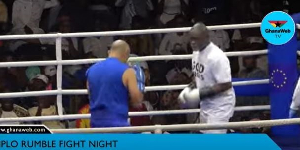- Home - News
- TWI News | TV
- Polls
- Year In Review
- News Archive
- Crime & Punishment
- Politics
- Regional
- Editorial
- Health
- Ghanaians Abroad
- Tabloid
- Africa
- Religion
- Election 2020
- Coronavirus
- News Videos | TV
- Photo Archives
- News Headlines
- Press Release
General News of Thursday, 28 December 2000
Source: Associated Press
Ruling Party Hopes for Win
 Ghana's ruling party, hoping to convince voters that its candidate represents change, is distancing itself from the country's longtime leader, outgoing President Jerry Rawlings.
Ghana's ruling party, hoping to convince voters that its candidate represents change, is distancing itself from the country's longtime leader, outgoing President Jerry Rawlings.
Vice President John Atta Mills, Rawlings' chosen successor, faces opposition leader John Agyekum Kuffuor in a runoff election Thursday after neither received the 50 percent required for an outright win in the first round on Dec. 7.
Kuffuor, a British-trained lawyer and veteran politician, won 48.4 percent of the vote. Mills won 44.8 percent.
``I am my own man, and I will have my own team,'' Mills said during a round of weekend campaign rallies.
Rawlings, a charismatic former fighter pilot, has dominated politics in the West African country for two decades. Originally a military dictator, he embraced democratic and free-market ideals in the 1990s, becoming a darling of Western donors.
But his overwhelming popularity has been dimmed in recent years by a steep decline in the country's once-thriving economy. Prices for cocoa and gold, Ghana's most important exports, have plummeted as oil prices have risen.
Many Ghanaians now say they would welcome a change of government.
``I like (the ruling party) but I think they have outlived their usefulness and so must give way,'' student Patrick Azaglo said at a recent rally.
Kuffuor, 62, has campaigned on a platform of ``positive change,'' calling attention to repeated accusations of corruption and human rights abuses against Rawlings' government.
Mills, 56, has in the past stressed the development and stability that the Rawlings regime has brought to Ghana.
Both candidates have promised to improve the economy, education and health services.
Five other candidates who together took only a small percentage of the first-round vote have endorsed Kuffuor.
The elections mark the end of an era for Ghana, where Rawlings is stepping down at the end of his second term in January. He won multiparty elections in 1992 and 1996, but is barred by the constitution he approved from running for another four-year term.
Ghana, which has experienced five military regimes since independence from Britain in 1957, has evolved under Rawlings, its longest-serving leader, into a multiparty nation with a flourishing independent press.
Rawlings' departure marks a rare commitment to democratic change in a region characterized by repressive leaders and flawed elections.
While mostly peaceful, the first round of voting was marred by post-election clashes between Kuffuor and Mills supporters in Ghana's Upper East region, which killed about 10 people.










